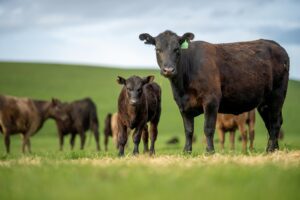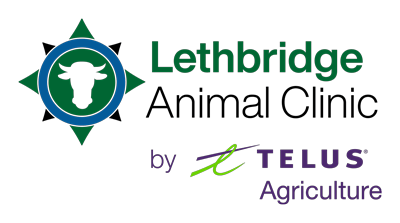10 Tips for Beginners Raising Cattle
Engaging in cattle raising can be a fulfilling journey, offering a unique blend of challenges and rewards. Whether you’re an experienced pet owner branching out or new to the world of large animals, this introductory guide will walk you through the key aspects of cattle care. If you’re near Lethbridge, Alberta, and seeking further guidance, Lethbridge Animal Clinic is here to help at (403) 327-4150.

1. Understanding Cattle Needs
Cattle, like any animal, have specific needs that must be met for their health and happiness. They require a balanced diet, which should be adjusted based on their age, breed, and purpose. For instance, dairy cows need different nutrition compared to beef cattle. Regular health checks are essential, too. This includes vaccinations and parasite control to prevent diseases. Having a relationship with a vet, like those at Lethbridge Animal Clinic, is invaluable for tailored advice and care.
Nutrition is not one-size-fits-all for cattle. For example, lactating cows need diets rich in energy and protein to support milk production. Similarly, young calves require a different diet for growth compared to mature cattle. It’s important to adjust feeding regimens based on these specific needs.
2. Adequate Shelter and Environment
Cattle thrive in environments where they feel safe and comfortable. This includes having adequate shelter to protect them from extreme weather conditions and spacious grazing areas. Proper fencing is also essential for their safety and to ensure they don’t wander. Regular maintenance of their living spaces, such as cleaning and repairing shelters, is crucial for their well-being.
The amount of space needed for cattle depends on the herd size. Overcrowding can cause stress and health issues, so providing enough pasture or range land is important. This space allows for natural behaviors like grazing and roaming, which are vital for their physical and mental health.
3. Health Management and Veterinary Care
Regular health management is key in raising healthy cattle. This includes practices like deworming and controlling external parasites. Also, being vigilant for any signs of illness or injury and addressing them promptly is critical. Regular health assessments, which can be done by professionals like those at Lethbridge Animal Clinic, help in maintaining the herd’s health.
Routine health checks are necessary for detecting health issues as early as possible. These should include body condition scoring, hoof health assessments, and monitoring for respiratory or digestive problems. Regular evaluations can help in identifying and addressing these issues when they are easiest to treat.
4. Understanding Cattle Behavior
Understanding cattle behavior is vital for effective management and welfare. Recognizing signs of distress or illness through their behavior can lead to early intervention, which is key to their health and production. Safe interaction techniques are necessary to ensure both your safety and that of the cattle.
Cattle have a complex social structure with a clear hierarchy. Understanding these dynamics is important for managing stress levels within the herd and can assist in grouping strategies to minimize conflicts.
5. Breeding and Reproduction
If you’re involved in breeding cattle, then you need to understand their reproductive cycle. This includes recognizing signs of estrus (heat) in cows and knowing the best times for breeding.
Proper management during the calving season involves closely monitoring pregnant cows, ensuring they have a safe and comfortable place to give birth, and taking care of the calves right after birth, which includes ensuring they receive colostrum. The guidance and support of an experienced large animal veterinarian can make calving less stressful and daunting, especially for those who are new to raising cattle.
6. Proper Handling and Safety
Handling cattle requires strong knowledge of their behaviors, patience, and using the right techniques and equipment. This ensures safety for both the handler and the cattle. Training in cattle handling and the use of equipment like cattle chutes can greatly improve safety and efficiency.
7. Record Keeping and Management
Keeping detailed records is another critical aspect of cattle farming. These records should include information on breeding, health treatments, growth rates, and feed consumption. Accurate and up-to-date records help you make informed decisions for herd management and future planning.
Using modern tools, including software like HerdTrax by TELUS Agriculture & Consumer Goods or mobile apps for cattle management can simplify record-keeping. These tools can help you track important data more accurately and efficiently, aiding in better herd management decisions overall.
8. Sustainable Practices
Sustainable farming practices benefit both the environment and the cattle. This includes managing grazing to prevent overgrazing and conserving water. Other practices like natural pest control and responsible waste management also contribute to sustainable cattle farming and a better quality of life for your cattle.
9. Community and Resources
Connecting with local farming communities and resources is a great way to gain support and knowledge. These communities offer a wealth of experience and advice that can be invaluable, especially for those new to cattle raising.
10. Planning and Goal Setting
Setting clear goals for your cattle-raising venture is important for success. This might include goals related to dairy production, beef production, or breeding. Having a well-defined plan helps in decision-making and achieving the desired outcomes.
Contact Us for More Advice on Cattle Raising
Lethbridge Animal Clinic is a leader in the industry of beef production and cattle raising. If you need more information or would like to consult with one of our veterinarians, contact us today at (403) 327-4150.
